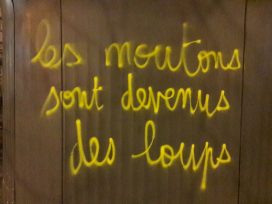Dear friend, if I had to pick somebody to be my executioner, the man with the black mask would be you. I’m sure that you wouldn’t hurt me, and that in the beyond I would walk past cascades of wind harps, through pink mists, past porphyry columns.
However, if I were looking for a biographer to chronicle my ideas and bad habits, or a devil’s advocate to plead my simple, humble cause, I would have to hesitate. I trust that you will not hold this against me. This is probably a divine curse for those who have sacrificed their tender young lives to studying things that happened in the past (Geistesgeschichte) and – it may be just a nasty blasphemy, but I will say it anyway – without having had any memory of them. Of course, neither in Sofia nor anywhere else did it occur to me to refer to my former opposition to communism, those youthful mumblings that you have so nicely attributed to me.
The paradox I touched upon in Sofia, superficially and hurried, was the following: there is a contradiction when it comes to judging the Bolshevik system – a system to which I was opposed, and to which I am still opposed today, when to do so no longer requires heroism or perspicacity. Or I am wrong? This paradox consists of two contradicting propositions that formed in relation to “real socialism” (I use the term coined by Comrade L. I. Brezhnev, an archetype of Soviet management.)
The first proposition was established before 1989: the Bolshevik system lied. “Communist” societies were ones that produced goods based on paid labour and a financial system (money); the workers were separated from the means of production (rendering socialist property a myth); and society was hierarchical, unequal and repressive. This was not the socialism defined by Marxist theory. This type of Soviet society betrayed true believers in the socialist system.
The second proposition was established after 1989: the Bolshevik system told the truth. The Soviet society was truly socialist. From this assertion we need to remove any transcendent critique of the dangers of the capitalist system, because we know what socialism was: the USSR, the People’s Republic of China, not to mention the Socialist Republic of Romania, with the Gulag, Canal, Gherla and Aiud.
What I have modestly tried to establish is that, fundamentally, the two official anti-communist assertions contradict one another. Both cannot simultaneously be correct. I, however, believe that the first proposition has its merits, however simplified it may be. The second proposition seems false to me, in the same way that the denouncement of anti-global, anti-imperial ideology by well-read men such as Domenico Losurdo and Luciano Canfora also seems false. As if liberalism were identical to Belgium, which deliberately assassinated about two million people in the Congo at the beginning of the twentieth century, and as if another model of social liberty were not possible, simply because it has been proven that genocide was the consequence of the liberal-capitalist regime. Nonsense, isn’t it?
Undoubtedly, leftwingers exist who can find excuses for the Soviet penal universe. But I don’t regularly discuss matters with them, only occasionally out of politeness, though not only out of politeness. Since I’m not one to assert rigid principles, I find an obscure fondness for a charming class enemy like you, dear Andrei.
Amitiés,
G. M. Tamás
P.S. As for conservatives, I don’t think they would feel that power belongs to them naturally, but that conservative philosophy, or – as Roger Scruton puts it – the “dogmatism” of conservatism, starts from the idea of human nature. It legitimates all political power in terms of nature (Hume, Oakeshott, Leo Strauss) and of harmony with this nature. The art of being conservative consists (or rather consisted) in the free, spontaneous, playful gesture of mastery without ulterior motive. It is aesthetic, anti-teleological: sprezzatura.
The “eternal Left”, on the other hand, following Marx, Lukacs and Althusser, settles on the land of a “truth regime”, as Alain Badiou calls it, a non-hierarchical, de-centred, disseminated truth, splendidly described by Galileo Galilei in Bertolt Brecht’s play: “Men always thought that stars were fixed upon a crystal vault, as not to fall. Now, we have the stamina to let them flow freely in space, without any point of support. And the earth rotates merrily around the sun and with it so do saleswomen and merchants, princes and cardinals, even the Pope. The universe lost its centre during the night, but it woke up next morning with many centres, so that the real centre of the world is to be found in each of them, or in none of them. And all of a sudden the universe became much more liveable”.
Meanwhile the “heroic right” (from Joseph de Maistre and Don Juan Donoso Cortés to Carl Schmitt and the young Cioran) finds its fundaments in the conceptual delirium of choosing between friend and foe. Those archetypes still exist, but they are all falling apart. I did not argue with you, I have just described the past.
Continue reading: Andrei Plesu responds






